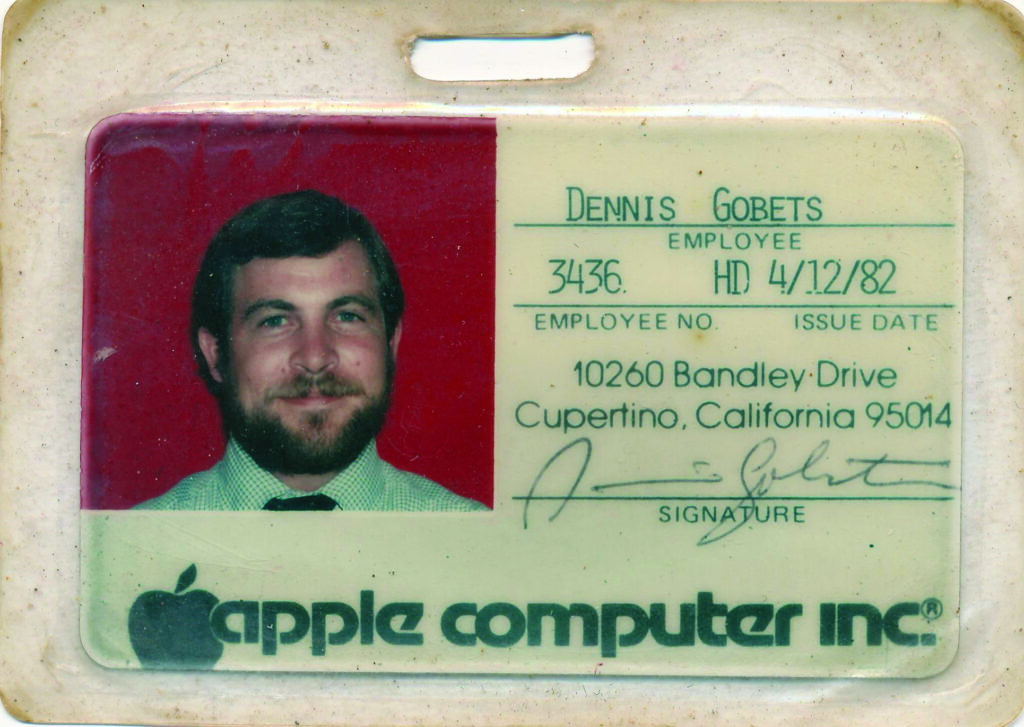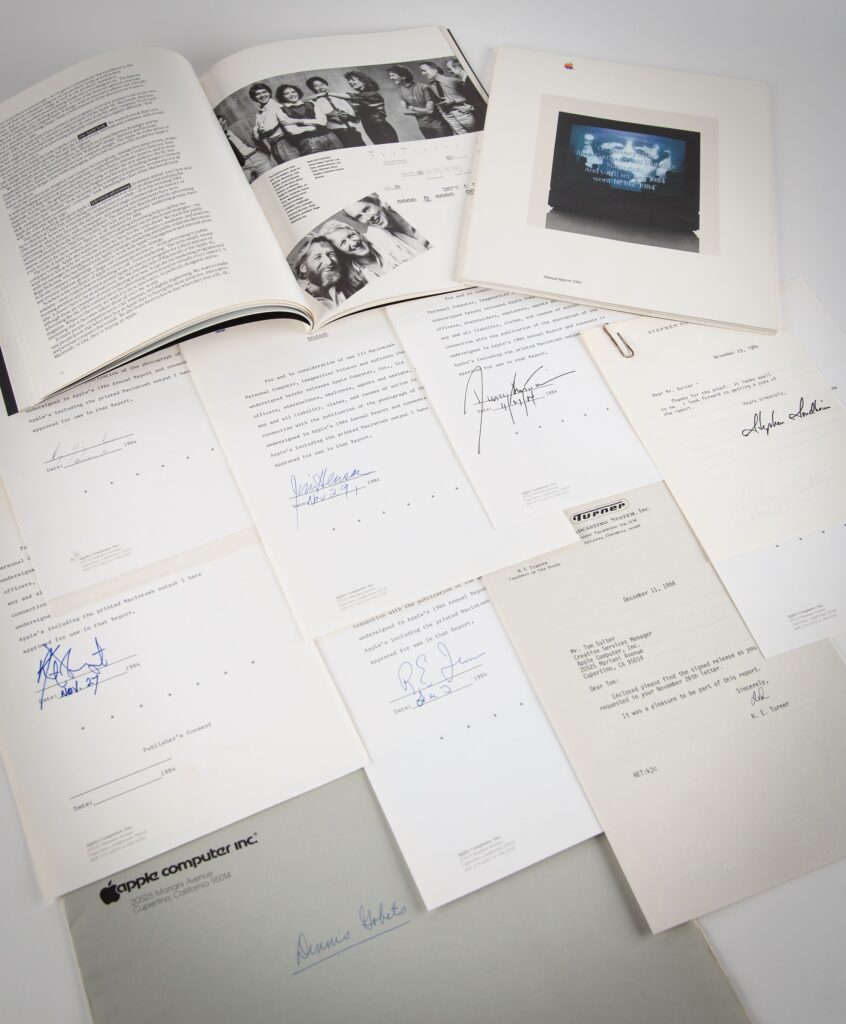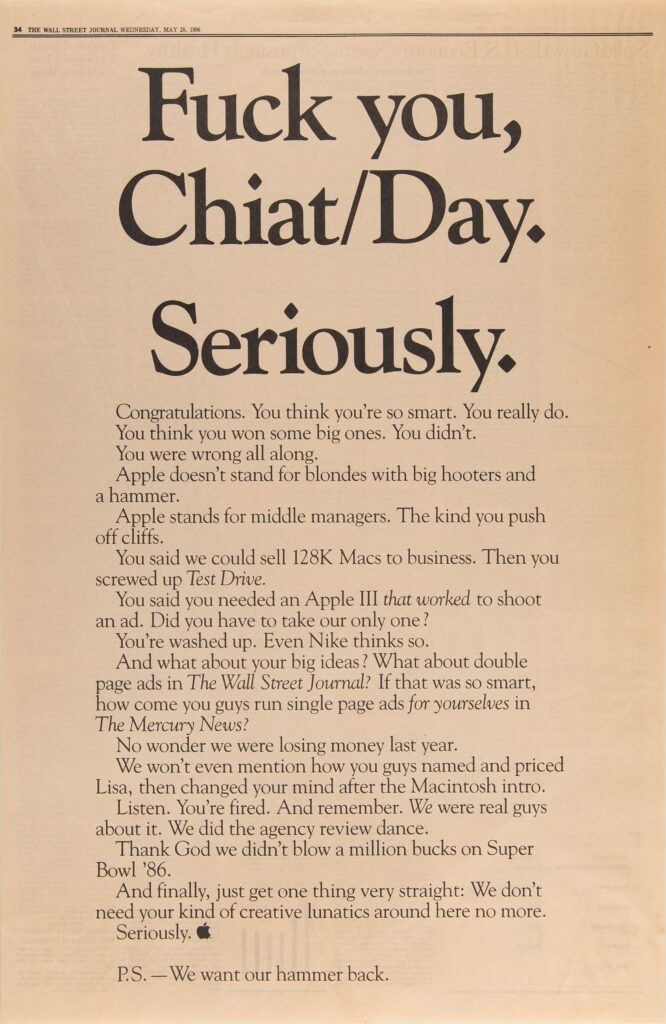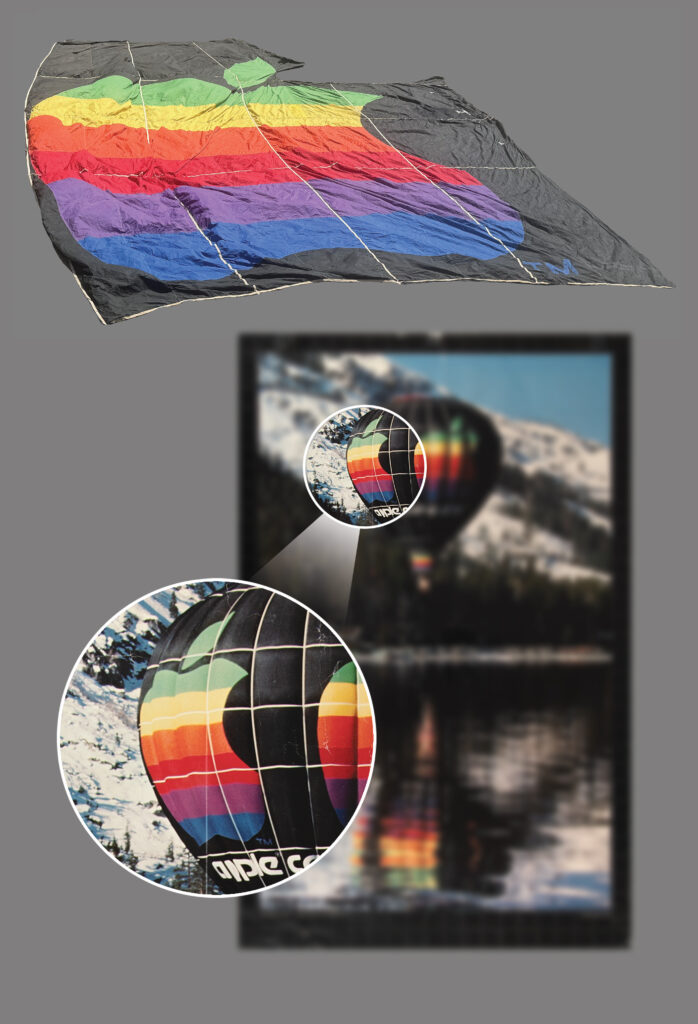by Brooke Kennedy
Just as Apple was about to launch the ill-fated Lisa, the company wanted to expand its operations. Bringing in new members, Apple sought to grow its marketing team to put personal computers in households across the country. Starting as a print and graphic coordinator, Dennis Gobets joined the fledgling business in early 1982, bringing his creative flair to Apple’s early promotions.

“It all seemed so surreal as a child… It often felt like the tech equivalent of Willy Wonka’s factory,” recalled one of his daughters. “I remember… my father’s ear-to-ear grin as he flagged down some dude named ‘Woz’ and introduced me. What struck me most was the passion I saw in my dad when he was there, a gleam mirrored in the eyes of every person I met. The people of Creative Services were some of the most talented folk the not-yet-Silicon Valley had to offer.”
At a time when nearly everything was manually assembled and physically shared, he and his team had a tough job. But his dedication and enthusiasm were mirrored in his work, in the office and outside on televisions and billboards everywhere. As a member of the creatives team, Gobets aided in the production of some iconic ads.

Uniquely designed and thoroughly informative, the 1984 annual report covered the financial successes of a pivotal year for the company. 1984 was the year of the Macintosh, when a single toss of a sledgehammer brought attention to the latest computer model from the masses and masters. Big name personalities and well-known Macintosh users Jim Henson, Stephen Sondheim, Kurt Vonnegut, Ted Turner, Maya Lin, and Dianne Feinstein granted permission for Apple to share their stories.
But, through all the technical whimsy, the role came with its own challenges. In an effort to expedite the printing of Apple’s 10th anniversary book, So Far: The First Ten Years of a Vision, the team went over budget. Gobets described the unusual process of getting the book to print in a memo hoping to explain the situation, which opened with a quote from an irate Steve Jobs, “What the fuck happened.”
In his own words he described the project’s production timeline, “We had less than 3 months to write, design, print and deliver our book. This is unheard of in the book publishing world”, going on to outline the traditional publication process, “Step 1. Somebody writes a manuscript. Step 2. Somebody else edits it. Step 3. The publisher brings in his legal beagles to make certain his chances of getting sued by the subjects of the book are slim…I started to round up potential publishers who could meet our timeframe and quality standards. The stated timeframe was mid-April to mid-May, after rejecting the idea of delivering for the Shareholders’ Meeting in mid-January.” Luckily for Dennis, he wasn’t out of the job. And he got to keep a copy of the book.
But this didn’t snuff out his love for office shenanigans.
In a move made by CEO John Sculley, Chiat/Day was fired as Apple’s advertising agency. Chiat/Day was the force behind what first brought Apple widespread recognition – the ‘1984’ Macintosh commercial. The ad featured a sledge hammer wielding jogger aiming to take down the controlling Big Brother (a symbol for Apple competitor IBM). Airing during Super Bowl XVIII to widespread acclaim, an attempt to recreate that success a year later was made with the release of a follow-up ad called ‘Lemmings.’ Consumer response was nowhere near as positive, and after that debacle Sculley situated Batten, Barton, Durstine & Osborn (BBDO) as Chiat/Day’s successor.
In response to Apple’s move, Jobs (who at this point was working on the first NeXT computer) took out a page in the Wall Street Journal to air his thoughts. In his ‘thank you’ letter to the marketing agency, he criticized the change as Apple moving away from what made them stand out – their forward-thinking spirit.

But when some Apple employees opened up their own Wall Street Journal newspapers, they were instead met with a more cutting headline, “Fuck you, Chiat/Day. Seriously.” Mimicking Jobs’s letter, the full page spoof read, in part, “Congratulations. You think you’re so smart. You really do. You think you won some big ones. You didn’t. You were wrong all along… You said we could sell 128K Macs to business. Then you screwed up Test Drive. You said you needed an Apple III that worked to shoot an ad. Did you have to take our only one?… And what about your big ideas? What about double page ads in The Wall Street Journal? If that was so smart, how come you guys run single page ads for yourselves in The Mercury News? No wonder we were losing money last year…You’re fired… And finally, just get one thing very straight: We don’t need your kind of creative lunatics around here no more. Seriously,” before ending it off with a scathing dig referencing ‘1984.’ “P.S. We want our hammer back.”
By the time he ended his tenure as Senior Production Manager, the small scrappy start-up was well on its way to becoming a trillion dollar corporation, and he picked up pieces from it along the way. Over the years, Dennis’s garage became an impressive exhibit of his experience of working at Apple HeadQuarters. Anything you can think of, from common items (t-shirts, brochures, pins, stickers) to the more niche (a letter opener, radio, camera, wine glasses) if it wasn’t bolted down, it would soon migrate to his home.
Even something considered trash by some found it’s way to his pile of treasure. One day, out by the dumpster behind his office, Gobets stumbled upon something that wouldn’t quite fit in his garage – a hot air balloon. For Apple’s 1981 promotional campaign, photographer Jim Huss captured the image of that very balloon over Donner Lake. With his trusty pocket knife in hand, he brought home a cut-out of the hot air balloon bearing the original rainbow fruit logo. And that piece? Now projected to sell for at least $10,000.

Gobets’s collection will head to the auction block in RR Auction’s Steve Jobs and the Apple Computer Revolution auction closing August 22, 2024. In addition to the items mentioned, the auction will play host to a 1983 annual report with notes from Jobs and Sculley, a sleek invitation for Steve Jobs’s 30th birthday, a selection of employee-exclusive apparel designed by creative services, and internal company pamphlets and newsletters.


